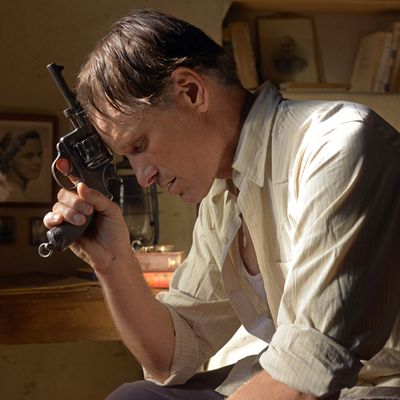
Viggo Mortensen has become the unlikeliest of movie stars. Ever since hitting the jackpot with the Lord of the Rings movies (after what seemed like half a lifetime of supporting roles in mainstream fare), he’s carved out the career other stars merely boast about wanting to have – avoiding big studio gigs and taking on small, arty fare, often using his own leverage and bankability to get these little passion projects made. Half the time, the multilingual actor doesn’t even perform in English; earlier this year, Lisandro Alonso’s Jauja had him speaking Spanish and Danish.
Now, in Far From Men, Mortensen plays a French schoolteacher in the Algerian countryside in 1954. Daru is the kind of unassuming, quiet character immediately made interesting by the fact that Mortensen is portraying him: There’s a haunted quality to the actor’s presence — to the way he moves, to the way he hesitates before speaking — that makes us pay attention whenever he’s onscreen. Daru lives and works out of a one-room schoolhouse set atop a majestic hill, surrounded by empty mountains, and we suspect there might be a good reason for that.
One day, a teenager named Mohamed (Reda Kateb), accused of killing his cousin, is brought to Daru. With the country rising up against the French, the local authorities don’t have the time or resources to deal with this kid. They want the teacher to take Mohamed to the town of Tinguit, so that the young man can be tried by the French (and, presumably, put to death). Daru doesn’t want to get involved, but he has little choice: Nobody else wants Mohamed, save for the family of his victim, who try to raid the school one night. Daru tries to free his captive, but the boy refuses to go: If he escapes, Mohamed reveals, his family will be targeted by those looking to avenge the man he killed; but if he allows himself to be killed by his victim’s family, then his own brothers will be forced to seek revenge. He wants to be tried and executed by the French, in order to stop a blood feud from engulfing his loved ones.
Far from Men is based loosely on Albert Camus’s oblique and tantalizing short story “The Guest,” which gives the film its set-up but not so much its plot. For its part, the film follows Daru and Mohamed on their long trek across the mountains, as they get to know each other – the weary, quiet veteran who has shielded himself from his fellow men, and the young man who knows little of the world but is prepared to make the ultimate sacrifice. Wandering through a countryside quickly spinning out of control, the two men come across brigands, rebels, and soldiers, and are gradually forced to engage with the world around them.
Written before Algeria established independence, Camus’s work was a despairing meditation on the monstrous impossibility of choice. Far From Men is more … I won’t say “optimistic,” but it seems to take the author’s work as a challenge. At the same time, the film is not quite the philosophical two-hander one might expect. Its thematic preoccupations take a backseat to more basic, accessible pleasures. What makes it work is the solemn efficiency of director David Oelhoffen’s storytelling and the quiet intensity of the two leads: The rough tenderness of Mortensen’s gaze plays off well against Kateb’s conflicted demeanor. The latter’s character, seemingly new to a world of ruthless choices, goes from wide-eyed fear to quiet resignation; he becomes a man before our eyes. For all the setting’s historical specificity and import, watching these two make their way through this violent, beautiful landscape, we realize we’re seeing something far more timeless and elemental unfold.


